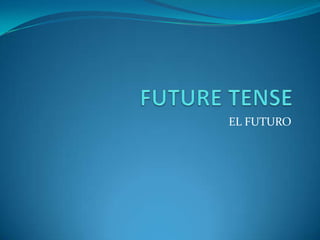Future Tense
•Als PPTX, PDF herunterladen•
4 gefällt mir•20,022 views
Los tres tipos de futuro en inglés y la condicional del primer tipo para ESO.
Melden
Teilen
Melden
Teilen

Empfohlen
Project perfect modals in the passive voice for speculating about the past.C17 U9 Project perfect modals in the passive voice for speculating about th...

C17 U9 Project perfect modals in the passive voice for speculating about th...colomboamericanopereira
Weitere ähnliche Inhalte
Was ist angesagt?
Project perfect modals in the passive voice for speculating about the past.C17 U9 Project perfect modals in the passive voice for speculating about th...

C17 U9 Project perfect modals in the passive voice for speculating about th...colomboamericanopereira
Was ist angesagt? (20)
C17 U9 Project perfect modals in the passive voice for speculating about th...

C17 U9 Project perfect modals in the passive voice for speculating about th...
Andere mochten auch
Andere mochten auch (7)
List of comparatives and superlatives - Short adjectives

List of comparatives and superlatives - Short adjectives
Ähnlich wie Future Tense
Ähnlich wie Future Tense (9)
Mehr von Antonio Romero
Mehr von Antonio Romero (15)
Kürzlich hochgeladen
Kürzlich hochgeladen (20)
SESION DE PERSONAL SOCIAL. La convivencia en familia 22-04-24 -.doc

SESION DE PERSONAL SOCIAL. La convivencia en familia 22-04-24 -.doc
AFICHE EL MANIERISMO HISTORIA DE LA ARQUITECTURA II

AFICHE EL MANIERISMO HISTORIA DE LA ARQUITECTURA II
Tema 10. Dinámica y funciones de la Atmosfera 2024

Tema 10. Dinámica y funciones de la Atmosfera 2024
Prueba libre de Geografía para obtención título Bachillerato - 2024

Prueba libre de Geografía para obtención título Bachillerato - 2024
2 REGLAMENTO RM 0912-2024 DE MODALIDADES DE GRADUACIÓN_.pptx

2 REGLAMENTO RM 0912-2024 DE MODALIDADES DE GRADUACIÓN_.pptx
🦄💫4° SEM32 WORD PLANEACIÓN PROYECTOS DARUKEL 23-24.docx

🦄💫4° SEM32 WORD PLANEACIÓN PROYECTOS DARUKEL 23-24.docx
BIOMETANO SÍ, PERO NO ASÍ. LA NUEVA BURBUJA ENERGÉTICA

BIOMETANO SÍ, PERO NO ASÍ. LA NUEVA BURBUJA ENERGÉTICA
Prueba de evaluación Geografía e Historia Comunidad de Madrid 4ºESO

Prueba de evaluación Geografía e Historia Comunidad de Madrid 4ºESO
PIAR v 015. 2024 Plan Individual de ajustes razonables

PIAR v 015. 2024 Plan Individual de ajustes razonables
ACRÓNIMO DE PARÍS PARA SU OLIMPIADA 2024. Por JAVIER SOLIS NOYOLA

ACRÓNIMO DE PARÍS PARA SU OLIMPIADA 2024. Por JAVIER SOLIS NOYOLA
Concepto y definición de tipos de Datos Abstractos en c++.pptx

Concepto y definición de tipos de Datos Abstractos en c++.pptx
Future Tense
- 1. FUTURE TENSE EL FUTURO
- 2. TIPOS DE FUTURO FUTURO CON WILL. FUTURO CERCANO (BE GOING TO). FUTURO CONTINUO CON VALOR DE FUTURO.
- 3. FUTURO CON WILL FORM: AFFIRMATIVE: I willgoto Madrid (I’llgoto Madrid). Shewill do herhomework (She’ll do herhomework). NEGATIVE: I willnotgoto Madrid (I won’tgoto Madrid). Shewillnot do herhomework (Shewon’t do herhomework). INTERROGATIVE: Wherewill I go? / Will I goto Madrid? Whatwillshe do? / Willshe do herhomework? SHORT ANSWERS: Yes, I will / No, youwillnot. Yes, shewill / No, shewon’t.
- 4. FUTURO CON WILL USES: Se usa para hacer predicciones: I thinkitwill rain tomorrow (Creo que lloverá mañana) También se usa para expresar decisiones espontáneas: I thinkI’llgowithyoutotheconcert (Creo que iré contigo al concierto) Y para ofrecer o pedir ayuda: Willyou drive me home, please? (¿Me llevas a casa en coche, por favor?)
- 5. LA PRIMERA CONDICIONAL La primera condicional se utiliza para referirse a situaciones posibles. Ejemplos: If I study, I willpass. (Si estudias, aprobarás: es posible) I won’thelpyouifyoubehavelikethat. (No te ayudaré si te portas así: es posible)
- 6. LA PRIMERA CONDICIONAL STRUCTURE: IF (PRESENT SIMPLE), (FUTURE WITH “WILL”). Ifsheworkstoday, shewon’thavetoworktomorrow. (FUTURE WITH “WILL”) IF (PRESENT SIMPLE). Shewon’thavetoworktomorrowifsheworkstoday.
- 7. FUTURO CERCANO FORM: AFFIRMATIVE: I’mgoingtovisit my familynextweekend. (Voy a visitar a mi familia la semana que viene) NEGATIVE: Sheisn’tgoingtovisitherfamilynextweekend. (Va a visitar a su familia la semana que viene) INTERROGATIVE: Are theygoingtovisittheirfamilynextweekend? (¿Van a visitar a su familia la semana que viene?) SHORT ANSWERS: Yes, they are. No, theyaren’t.
- 8. FUTURO CERCANO USES: Se utiliza para hablar de acciones próximas en el tiempo basada en una evidencia presente: Look! She’sgoingtofall! (¡Mira! ¡Se va a caer!) También para hablar de planes generales: I’mgoingtobuysomeclothesnow. Willyou come withus? (Voy a comprarme ropa ahora. ¿Vienes con nosotros?)
- 9. PRESENTE CONTINUO FORM: AFFIRMATIVE: I’mflyingto New York in December. NEGATIVE: Sheisn’tflyingto New York in December. INTERROGATIVE: Issheflyingto New York in December? SHORT ANSWERS: Yes, sheis. No, sheisn’t.
- 10. PRESENTE CONTINUO USE: Se utiliza principalmente para hablar de planes fijos. Normalmente llevan una expresión de tiempo de futuro, y se traduce como presente simple en español: I’mgoingto Madrid onMay 13th. (Voy a Madrid el 13 de mayo) Recordamos que el presente continuo normalmente va con expresiones como now, at themomenty otras para indicar lo que se está haciendo en el momento: She’sreading a book at themoment. (En este momento está leyendo un libro)